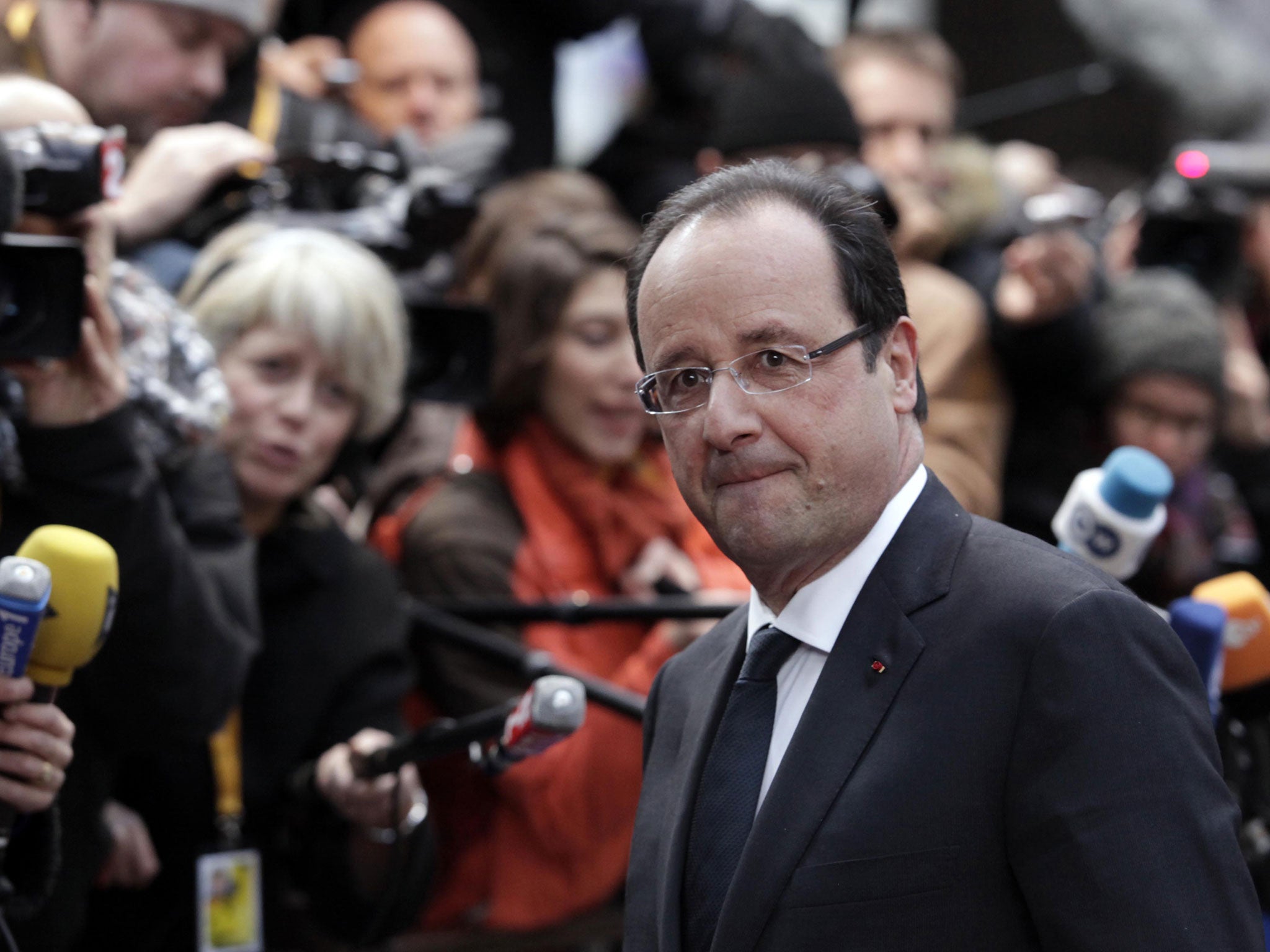Francois Hollande makes drastic U-turn on tax cuts and welfare in bid to save presidency
President says he is ready to axe the ‘excesses and abuses’ of France’s social model

François Hollande will try to relaunch his foundering presidency in the next 10 days with plans to cut public spending and reduce taxes – especially taxes on jobs and business.
The French President’s new approach, though vague so far, is being compared with the abrupt U-turn towards more market-driven policies enacted by his Socialist predecessor, François Mitterrand, during the Reagan-Thatcher era of the 1980s.
In a series of speeches, Mr Hollande will lay out the main lines of a policy to reduce the cost of labour and try to halt the slide in French industry. His new approach is described as an “acceleration” of the timid reforms undertaken since he was elected in 2012.
The policy has been welcomed by employers but castigated by unions and the left as a break from the President’s statist approach of the past 20 months. Until now, Mr Hollande’s government has been reducing the deficit with tax increases and modest spending cuts. He has tried to push back the rise in unemployment by projects such as job-creation schemes for the young.
The economy remains more sluggish than that of Britain or Germany. Unemployment has risen towards 11 per cent, despite Mr Hollande’s promise to reverse the tide by the end of last year. Manufacturing activity shrank in December, while increasing in the rest of Europe.
In his televised new year address, Mr Hollande offered a “responsibility pact” to employers. He said he would ease the high payroll taxes, or “social charges”, which inflate the cost of labour. In return, employers would be expected to promise to invest in France and to create new jobs.
Mr Hollande has a habit of making dramatic-sounding promises which become less dramatic when the small-print is revealed. Cutting, or shifting, payroll taxes which fund the €650bn welfare state would amount to a radical change in France’s social model.
Reductions in payroll social charges were promised, but never delivered, by Mr Hollande’s predecessors, Nicolas Sarkozy and Jacques Chirac. After payment of these charges, the average hourly labour cost in France is €35.50 (£29.45), compared with €32.50 (£26.96) in Germany.
Will the cost of the welfare state be reduced or the burden shifted on to other forms of taxation? No details have been offered so far. Mr Hollande said last week, however, that he was ready to “preserve” the French social model by taking an axe to its “excesses and abuses”, especially in health policy and family-support programmes. In his new year greetings to the government, he said he was ready to push through changes by “edict” rather than by legislation – implying that he is willing to short-circuit opposition from the left wing of his own majority if necessary.
In an interview with Le Monde, Pierre Gattaz, the president of the employers’ federation Medef, welcomed Mr Hollande’s new departure. He said employers could guarantee to create “a million” new jobs if social charges were cut, public spending was reduced and hiring and firing laws were “simplified”.
Trade unions and the left are waiting to see the small print of Mr Hollande’s ideas but they already accuse him of abandoning the “anti-finance” promises on which was elected. “Neither the state nor the employers’ federation can force businesses to create jobs,” said Jean-Claude Mailly, of the Force Ouvrière trades union federation.
Some political commentators have compared Mr Hollande’s change of direction with the U-turn in economic policy performed by President Mitterrand in 1983-4. After defying the monetarist zeitgeist for two years with nationalisations and improved welfare benefits, he was finally obliged by market pressure on the franc to adjust to the liberal winds from across the Channel and the Atlantic.
Bashing the French: the media hit back
France is a country of expensive milk and no money, according to a lurid article published by the US website Newsweek. The French press reacted to the piece, written by the Paris-based British journalist Janine di Giovanni, with undisguised delight on Monday. Le Monde said the article contained “an incredible number of factual errors”. Newsweek claimed, for instance, that a half-litre of milk in France cost “nearly four dollars” (around €3). The French supermarket price is nearly 10 times less at 72 cents a litre. French blogs were especially delighted with Ms di Giovanni’s assertion – stolen from George W Bush – that “the problem with the French is they have no word for entrepreneur”. Nor does France have a word for cliché.
Subscribe to Independent Premium to bookmark this article
Want to bookmark your favourite articles and stories to read or reference later? Start your Independent Premium subscription today.

Join our commenting forum
Join thought-provoking conversations, follow other Independent readers and see their replies